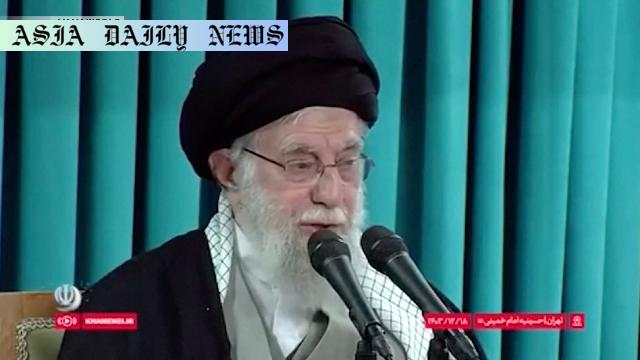Nuclear deal: Iran’s supreme leader refuses nuclear negotiations, dismissing Trump’s peace overtures.
Iran’s supreme leader Ayatollah Khamenei rejected Trump’s call for nuclear deal negotiations.
Khamenei expressed distrust in negotiations, suggesting they lead to endless demands beyond the nuclear program.
Tehran strongly opposes US efforts to curb its missile program and Middle East policies.
Observers predict worsening US-Iran relations amid disagreement over diplomatic efforts.

Introduction
The tension between Iran and the United States over the nuclear deal continues to escalate, with Iran’s supreme leader, Ayatollah Ali Khamenei, firmly dismissing the idea of negotiations. His statement comes in direct response to US President Donald Trump’s remarks expressing a willingness to engage in dialogue. This latest development signals a significant impasse in diplomatic efforts to resolve the complex issues surrounding Iran’s nuclear program and its broader geopolitical activities.
Khamenei’s Refusal: A Historical Context
Ayatollah Khamenei’s rejection of negotiations is not a new occurrence. Iran has historically viewed Western diplomatic overtures, particularly from the United States, with suspicion. Khamenei highlighted that negotiations often serve as a tool for foreign governments to impose their demands. In his speech, he emphasized that agreeing to one demand often leads to others, such as curbing missile capabilities or withdrawing support for allied groups in the Middle East. For Iran, such demands are perceived as an infringement on its sovereignty and strategic interests.
Trump’s Position: Seeking Leverage
From the US perspective, Trump’s administration has consistently pushed for a new nuclear deal that addresses what it perceives as gaps in the 2015 Joint Comprehensive Plan of Action (JCPOA). Trump has publicly stated his desire to shape a deal that restricts Iran’s nuclear and missile programs while limiting its regional influence. The US has also employed economic sanctions as a tool to pressure Tehran into compliance. However, despite this strategy, Tehran has remained steadfast in its refusal to renegotiate, accusing the US of bad faith.
The Impact on US-Iran Relations
The deadlock over the nuclear deal has further strained already fragile US-Iran relations. The disagreement extends beyond the nuclear program itself to a broader ideological and geopolitical conflict. Observers note that without mutual concessions, the chances of rapprochement remain slim. This ongoing tension risks escalating into military conflict or entrenching existing sanctions that have significantly impacted Iran’s economy.
Conclusion: A Call for Global Diplomacy
The refusal by Iran’s supreme leader to entertain nuclear negotiations under the terms proposed by the US reflects deep-seated mistrust and competing strategic goals. While the Trump administration views diplomacy as a means to curtail Iran’s influence, Tehran sees it as a potential compromise of its national interests. The international community now faces the challenge of mediating between these opposing stances to prevent further escalation and foster a path toward sustainable peace.



Commentary
Khamenei’s Position Reflects Long-standing Distrust
Ayatollah Khamenei’s firm rejection of negotiations with the Trump administration underscores a history of mistrust that has defined US-Iran relations for decades. While diplomatic overtures are typically seen as pathways to resolution, for Iran, they often represent a threat to sovereignty. Khamenei’s comments reflect a core belief that negotiations with the US would lead to an endless cycle of demands. This perspective is rooted in Iran’s past experiences, where agreements were perceived as benefiting the West at Iran’s expense.
The Complexity of US-Iran Relations
The dynamics between the US and Iran are far more intricate than a simple disagreement over a nuclear program. They are entangled in a broader geopolitical struggle that includes disputes over missile development, regional influence, and ideological dominance. The Trump administration’s strategy of maximizing pressure through sanctions has only exacerbated these tensions. From Tehran’s perspective, these actions are not merely coercive but are seen as attempts to undermine its government and weaken its support base among allied groups in the region.
The Search for Middle Ground
Despite the pessimism surrounding US-Iran relations, there remains a sliver of hope for diplomacy. Global stakeholders, including European nations and international organizations, must take a proactive role in mediating between the two nations. While the road to reconciliation is undoubtedly challenging, finding middle ground is essential for regional stability and global security. It requires genuine efforts to address the concerns of both parties without disproportionately favoring one over the other.
Final Thoughts
The rejection of Trump’s proposed negotiations by Khamenei is a reminder of the deep chasm that separates Iran and the US. However, history has shown that even the most entrenched conflicts can be resolved through sustained dialogue and compromise. As tensions rise, the need for patient, inclusive diplomacy becomes even more critical. Both nations, along with the international community, must prioritize long-term stability over short-term gains.